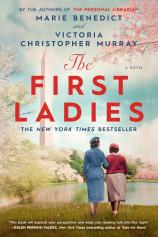

1. First Lady Eleanor Roosevelt is a well-known historical figure in America, but were you familiar with civil rights activist Mary McLeod Bethune before reading this book? Having finished THE FIRST LADIES, what are your views on her and her role in history? How might you rewrite her back into the narrative?
2. Eleanor and Mary were both so accomplished in their professional lives. What personality traits do you think helped them achieve this success?
3. Eleanor and Mary came from very different family backgrounds. How did their families and early experiences inform the women they became and the roles they chose to play in their communities?
4. At the outset of the book, Mary and Eleanor handle the women at the club luncheon very differently. How would you have reacted?
5. Eleanor and Mary became close friends at a time when Black and white women were not often publicly friends. Why do you think they became such close friends? What inspired each of them to pursue the friendship? What interests and personality attributes drew them together?
6. Through the course of their friendship, Mary and Eleanor had challenging conversations about race, and they faced public and private opposition to their friendship. Why do you think Mary and Eleanor were able to have these difficult conversations and remain friends? How did they combat both the public and private opposition to their alliance?
7. How did Eleanor and Mary influence each other’s lives? What did they learn from each other? How did they help each other achieve their dreams and goals?
8. How did Mary and Eleanor’s friendship change over the course of the book? What factors influenced this transformation?
9. Eleanor and Mary both had husbands who were unfaithful to them. Each woman responded differently to her husband’s infidelity. What life circumstances informed the decisions they made? What did you think of their choices?
10. Mary and Eleanor were continually pushing boundaries, challenging the status quo, and working together to bring about policy change. How did they use the media to help them? What did you think were the most effective ways they advocated for equality?
11. Sara Delano Roosevelt, Eleanor’s mother-in-law, could be very critical of Eleanor, but she also supported Eleanor and Mary at crucial moments. What motivated her actions and opinions?
12. What did you think of Franklin Delano Roosevelt? In some instances, he was a great supporter of Eleanor and Mary’s work, but at other times, he refused to help them for political reasons. How did you feel about his decisions at various points in the book?
13. What did Mary’s and Eleanor’s relationships with their children and grandchildren illustrate about their characters and motivations?
14. What did you think about the way Mary addressed racism in the book? For example, her encounter with the woman in the clothing store or with the train conductor. How did her reaction to her grandson’s terrible treatment at the beach strike you?
15. THE FIRST LADIES offers an up-close look at United States politics in the 1920s, ’30s and ’40s. Do you feel like there are any parallels to US politics today? What has changed, and what felt familiar? Were you surprised by any of the depictions?